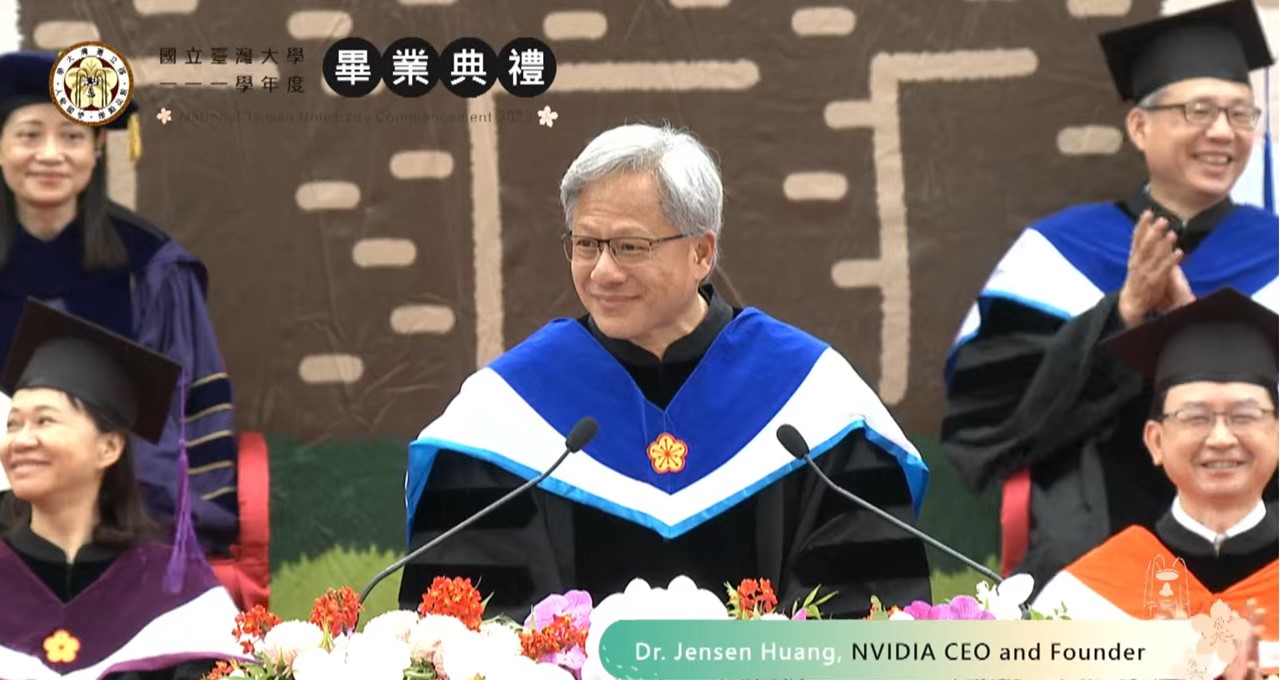“You are running for food, or you are running from becoming food. And often times, you can’t tell which. Either way, run.”
NVIDIA founder and CEO Jensen Huang today urged graduates of National Taiwan University to run hard to seize the unprecedented opportunities that AI will present, but embrace the inevitable failures along the way.
Whatever you pursue, he told the 10,000 graduates of the island’s premier university, do it with passion and conviction — and stay humble enough to learn the hard lessons that await.
“Whatever it is, run after it like we did. Run. Don’t walk,” Huang said, having swapped his signature black leather jacket for a black graduation robe, with the school’s plum-blossom emblem highlighting a royal blue, white and aqua collar.
“Remember, either you are running for food; or you are running from becoming food. And often times, you can’t tell which. Either way, run.”
Huang, who moved from Taiwan when he was young, recognized his parents in the audience, and shared three stories of initial failures and retreat. He called them instrumental in helping forge NVIDIA’s character during its three-decade journey from a three-person gaming-graphics startup to a global AI leader worth nearly a trillion dollars.
“I was … successful — until I started NVIDIA,” he said. “At NVIDIA, I experienced failures — great big ones. All humiliating and embarrassing. Many nearly doomed us.”
The first involved a key early contract the company won to help Sega build a gaming console. Rapid changes in the industry forced NVIDIA to give up the contract in a near-death brush with bankruptcy, which Sega’s leadership helped avert.
“Confronting our mistake and, with humility, asking for help saved NVIDIA,” he said.
The second was the decision in 2007 to put CUDA into all the company’s GPUs, enabling them to crunch data in addition to handling 3D graphics. It was an expensive, long-term investment that drew much criticism didn’t pay off for years until the chips started being used for machine learning.
“Our market cap hovered just above a billion dollars,” he recalled. “We suffered many years of poor performance. Our shareholders were skeptical of CUDA and preferred we improve profitability.”
The third was the decision in 2010 to charge into the promising mobile-phone market as graphics-rich capabilities were coming into reach. The market quickly commoditized, though, and NVIDIA retreated just as quickly, taking initial heat but opening the door to investing in promising new markets — robotics and self-driving cars.
“Our strategic retreat paid off,” he said. “By leaving the phone market, we opened our minds to invent a new one.”
Huang told grads that of the parallels in terms of boundless promise between the world he entered upon graduating four decades ago, on the cusp of the PC revolution, and the brave new age of AI they are entering today.
“For your journey, take along some of my learnings,” he said. Admit mistakes and ask for help; endure pain and suffering to realize your dreams; and make sacrifices to dedicate yourself to a life of purpose.
